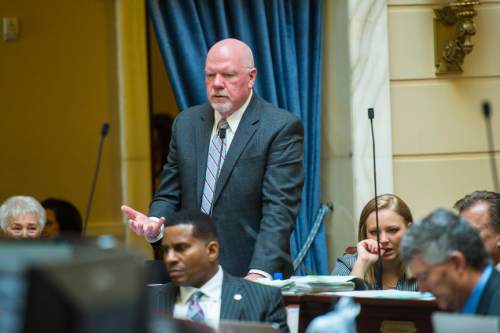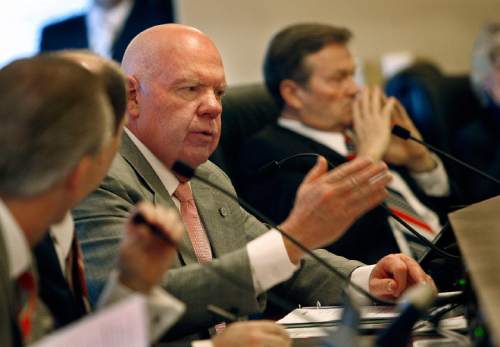This is an archived article that was published on sltrib.com in 2015, and information in the article may be outdated. It is provided only for personal research purposes and may not be reprinted.
Washington • A state senator, a historian and a former Salt Lake City Council member are among Utahns who filed a class-action suit in federal court this week against former President George W. Bush, former Vice President Dick Cheney and others over alleged widespread government surveillance of phone calls, emails and texts during the 2002 Winter Olympics.
The suit, which seeks a court order barring such domestic spying and an unspecified amount of money, argues that Bush, Cheney and other high-ranking federal officials violated constitutional rights of Americans when they allowed the National Security Agency and FBI to monitor the content of all emails and text messages as well as to capture data on telephone calls in the Salt Lake City area during the Winter Games.
The suit was filed by six initial plaintiffs, including state Sen. Howard Stephenson, R-Draper, former Salt Lake City Council member and mayor's spokeswoman Deeda Seed and historian Will Bagley. It was brought by former Salt Lake City Mayor Rocky Anderson, a vocal critic of Bush during his eight years as president.
Anderson, now in private practice, says Bush, Cheney, former NSA Director Michael Hayden and Cheney's attorney, David Addington, are being sued in their personal capacity because even as elected or appointed officials, they had no authority to order such surveillance.
The suit includes place- holders for 50 unnamed officials, referred to as John Does.
Bush "had no more authority, constitutionally or legally, to do what he did in ordering illegal surveillance than if he'd ordered someone to go kill a child on the street," Anderson said Wednesday. "Our president is not supposed to be a tyrant, a dictator who can make up the rules as he goes along. But that's how the Bush administration conducted itself."
Meanwhile, Anderson also filed nearly 200 claims with the NSA, FBI, Department of Justice and the Executive Office of the President seeking monetary damages for the surveillance first reported by The Wall Street Journal two years ago.
The newspaper cited unnamed government officials in reporting that the NSA and FBI "monitored the content of all email and text communications in the Salt Lake City area" around the time of the 2002 Games.
A top-secret inspector general's report from 2009 — leaked to The Guardian newspaper by former NSA contractor Edward Snowden — detailed an agreement between the spy agency and "Company E," thought to be Qwest Communications, to "provide call detail records ... in support of security for the 2002 Olympics in Salt Lake City."
Stephenson, a conservative who says he voted for Bush both times he was up for election, said privacy protections and judicial oversight of government surveillance are issues that span the political divide. And Stephenson says he's concerned any time the government "willy-nilly" circumvents Fourth Amendment rights.
"It's frightening to think that a president could order such surveillance and get away with it," Stephenson said, adding that he believes the purported 2002 program may have been the biggest government spy operation in U.S. history. "It doesn't matter whether the president was Republican or Democrat.
"I supported Bush on most of his policies as well," Stephenson added, "but that doesn't mean that he should not be held accountable and the government held accountable for violations of our constitutional rights."
John Saltas, publisher of the Salt Lake City alternative newspaper City Weekly, is one of the Utahns who filed a claim with the NSA, FBI and Justice Department, and is asking for damages of $1 million. The newspaper's editor, Jerre Wroble, says she's not sure how the process will shake out but believes more people, and more news outlets, would have signed up if they had more time. By law, the claims had to be filed by Thursday.
"In the case of a newspaper or any media outlet having that information in the hands of the government is a serious issue," Wroble says of the purported surveillance during the Games. "We all work with confidential sources, and we all have reason to want our information protected from the government. And to think that they were capturing all the information from people in our area is disconcerting and upsetting for all of us."
Under federal law, claims must be filed with an agency to allow them 60 days to respond before a lawsuit can be filed in court. Those claims are separate from the class-action suit.
The FBI declined to comment on pending litigation. The defendants in the class-action case could not be reached for comment, the Justice Department declined to comment, and the NSA did not respond to emailed questions.













